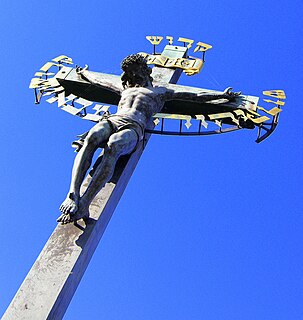Related Research Articles

Franz Joseph Haydn was an Austrian composer of the Classical period. He was instrumental in the development of chamber music such as the string quartet and piano trio. His contributions to musical form have led him to be called "Father of the Symphony" and "Father of the String Quartet".

The Creation is an oratorio written between 1797 and 1798 by Joseph Haydn, and considered by many to be one of his masterpieces. The oratorio depicts and celebrates the creation of the world as described in the Book of Genesis.

Joseph Martin Kraus, was a German-Swedish composer in the Classical era who was born in Miltenberg am Main, Germany. He moved to Sweden at age 21, and died at the age of 36 in Stockholm. He has been referred to as "the Swedish Mozart", and had a life span very similar to Mozart's.

Symphony No. 40 in G minor, K. 550 was written by Wolfgang Amadeus Mozart in 1788. It is sometimes referred to as the "Great G minor symphony", to distinguish it from the "Little G minor symphony", No. 25. The two are the only extant minor key symphonies Mozart wrote.

The Seasons is a secular oratorio by Joseph Haydn, first performed in 1801.

Gottfried Freiherr van Swieten was a Dutch-born Austrian diplomat, librarian, and government official who served the Holy Roman Empire during the 18th century. He was an enthusiastic amateur musician and is best remembered today as the patron of several great composers of the Classical era, including Joseph Haydn, Wolfgang Amadeus Mozart, and Ludwig van Beethoven.

The Seven Last Words of Our Saviour on the Cross is an orchestral work by Joseph Haydn, commissioned in 1786 for the Good Friday service at Oratorio de la Santa Cueva in Cádiz, Spain. Published in 1787 and performed then in Paris, Rome, Berlin and Vienna, the composer adapted it in 1787 for string quartet, approved a version for solo piano in the same year, and finally adapted it in 1796 as an oratorio.
Concentus Musicus Wien (CMW) is an Austrian baroque music ensemble based in Vienna. The CMW is recognized as a progenitor of the period-instrument performance movement.

The composers Wolfgang Amadeus Mozart (1756–1791) and Joseph Haydn (1732–1809) were friends. Their relationship is not very well-documented, but the evidence that they enjoyed each other's company and greatly respected each other's work is strong, and suggests that the elder Haydn acted, in at least a minor capacity, as a mentor to Mozart. Six string quartets by Mozart are dedicated to Haydn, the "Haydn" Quartets.
Mathias Haydn was the father of two famous composers, Joseph and Michael Haydn. He worked as a wheelwright in the Austrian village of Rohrau, where he also served as Marktrichter, an office akin to village mayor.

Der krumme Teufel, Hob. 29/1a, was Joseph Haydn's first opera. This German-language comic opera in the genre of Singspiel was commissioned by its librettist, leading comic actor Joseph Felix von Kurz. It was forbidden after two acclaimed performances in Vienna due to "offensive remarks in the text", but later revived and probably revised as Der neue krumme Teufel, Hob. 29/1b. The music is lost, though a libretto survives for each version.

Giuseppe Carpani was an Italian man of letters. He is remembered in large part for his role in the history of classical music: he knew Haydn, Mozart, Salieri, Beethoven, and Rossini, and served them in various ways as poet, translator, and biographer.
Maria Wilhelmine von Thun und Hohenstein, born Uhlfeldt was a Viennese countess. She is remembered as the sponsor of a musically and intellectually outstanding salon and for her patronage of music, notably that of Mozart and Beethoven.

The Vienna Singverein is the concert choir of the Vienna Musikverein with around 230 members. It is regularly requested by top orchestras and conductors for large and varied projects.
Georg August von Griesinger was a tutor and diplomat resident in Vienna during the late 18th and 19th centuries. He is remembered for his friendships with the composers Joseph Haydn and Ludwig van Beethoven, and for the biography he wrote of Haydn.
Martin Eybl is an Austrian musicologist.

Il ritorno di Tobia is an oratorio in two parts composed in 1775 by Joseph Haydn. The work is the first oratorio the composer wrote and, according to Jones, was "his most extended and ambitious composition up to that time".

The Tonkünstler-Societät was a benevolent society for musicians in Vienna, which lasted from the mid-18th century to the mid-20th. Its purpose was "to support retired musicians and their families". Beginning in 1772, the Society mounted a series of benefit concerts, often with large forces of performers, at which were performed works by leading Classical-period composers, including Joseph Haydn, Wolfgang Amadeus Mozart, and Ludwig van Beethoven.

Ignaz (Franz) von Mosel was an Austrian court official, composer and music writer.

Der Messias, K. 572, is Wolfgang Amadeus Mozart's 1789 German-language version of Messiah, George Frideric Handel's 1741 oratorio. On the initiative of Gottfried van Swieten, Mozart adapted Handel's work for performances in Vienna.
References
- Antonicek, Theophil (1972–1973) "Vergangenheit muss unsre Zukunft bilden": Die patriotische Musikbewegung in Wien und ihr Vorkampfer. Revue belge de Musicologie / Belgisch Tijdschrift voor Muziekwetenschap 26: 38–49.
- Braunbehrens, Volkmar (1990) Mozart in Vienna. Translated from the German by Timothy Bell. New York: Grove and Weidenfeld. Includes a chapter covering van Swieten and his times.
- DeNora, Tia (1991) Musical Patronage and Social Change in Beethoven's Vienna. The American Journal of Sociology 97:310-346.
- Jones, David Wyn (2009) "Schwarzenberg, Prince Joseph (Johann Nepomuk Anton Carl)," article (by Jones) in David Wyn Jones (ed.) Oxford Composer Companions: Haydn. Oxford: Oxford University Press.
- Olleson, Edward (1963) "Gottfried van Swieten: Patron of Haydn and Mozart," Proceedings of the Royal Musical Association, 89th Sess. (1962–1963), pp. 63–74. Available online from JSTOR.
- Griesinger, Georg August (1810) Biographical Notes Concerning Joseph Haydn. Leipzig: Breitkopf und Härtel. English translation by Vernon Gotwals, in Haydn: Two Contemporary Portraits, Milwaukee: University of Wisconsin Press.